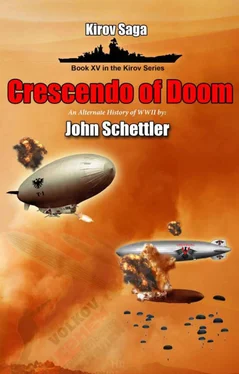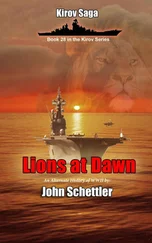But all this assumed that their defenders needed human eyes to see and target the incoming threat, which was also wrong. And the Kingfishers assumed they would be safely out of flak range when they deployed their weapons, which was also not the case. The Italian pilots were not expecting any flak threat for some time. Many were new, sent down from the mainland in recent weeks to flesh out the squadrons. They had been warned by their mates about the guided rockets that had so devastated earlier attacks against the British fleet, but most had not seen this happen, and would therefore have to endure the initial shock and horror of the SAM attack.
Volsky was watching Fedorov closely. The young man seemed to be well in charge of the situation, and he had become a very good officer in his brief, yet trying, time as Captain. Yet he had come to know Fedorov very well in these many long months, and he could also see that something was troubling him. He was covering it well, but it was there, just beneath the surface of his self-imposed calm. He eased over to his Captain, leaning his way and speaking in a quiet tone of voice, so the other members of the crew would not hear them.
“Something troubling you, Mister Fedorov?”
“Sir?” Fedorov did not quite know what was eating at him, but now he realized that it must be obvious if Volsky had seen it so plainly. He said the obvious thing, telling Volsky that he never really felt at ease in a combat situation.
“Ah,” said Volsky. “This is nothing unusual, Fedorov. I have over 30 years at sea, and I still get that twinge of anxiety when the missiles fly. It is not only the risk to the ship and crew. Lord knows we have seen some most unexpected things happen in battle of late. Half the time we end up somewhere else when things settle down.”
Fedorov gave him a thin smile. “I think we’ll be staying put this time, sir. But in some ways, that is what is bothering me.”
“Oh? Tell me.”
“Staying put. Dobrynin has removed those new control rods and put them in rad-safe containers. Rod-25 is still aboard Kazan , and I do not think we will be setting off a special warhead in this scenario. So I think we’ll stay put. Yet it is already May, Admiral. Now we have less than 60 days to spend here before we face that big, unanswered question.”
“I see… So you are worried about this paradox business again, and thinking we must be somewhere else come July 28.”
Fedorov nodded, glancing at Rodenko, who seemed absorbed with his radarman at the moment. Samsonov was receiving his targeting data, and keying his missiles to specific planes in the formation to make sure each missile found a unique target. In doing so, he was the unseen hand of death, passing casual and thoughtless judgment on the men now flying those planes, not knowing their fate was being decided by a tap of his finger on the digital display. He tapped away, consigning one soul after another to oblivion, until all twelve missiles were targeted.
“Well,” said Volsky. “Dobrynin can always re-install those control rods. For that matter, we could also try to move again the same way we got here. Kazan could hover right beneath us and use Rod-25.”
“I’ve considered that,” said Fedorov.
“But yet you take no comfort from those alternatives. You remain uncertain. Yes?”
“I do, sir. We already know that one of those two new rods moved us in space. It was able to take us slightly out of phase, but did not really open a breach in time. Yes, we vanished, but then re-appeared in this same time period. I think it was only the earth’s rotation during that interval that saw us manifest in a different location. And as for Rod-25, I’m worried about what Dobrynin tells me. He says that it is showing signs of wear and soon may reach a point where he would normally remove it from service for disposal.”
“Just like all the rest of us,” said Volsky. “Captains and Kings, Admirals and Emperors, we all get old one day, and then the world will find a way to dispose of us as well.”
That remark hit a deeper vein in Fedorov than Volsky may have intended. He had hoped to lighten the mood a bit, with the self-deprecating humor he often used, bemoaning the extra weight he carried in later years, the labor of getting up ship’s ladders and stairs, the inevitable loss of vitality that came with age. But Fedorov heard something more there, and it finally hit the real nub of the worry within him.
“There is one more alternative,” he said quietly.
Volsky gave him a long look, almost as if he was trying to read the other man’s thoughts. “What now, Fedorov, another of your mysterious plans? What alternative?”
“No sir… It won’t be my doing. The third alternative would be the hand of fate, and I guess that is why I feel somewhat anxious now. Yes, we have the missiles to defend ourselves here, but there is one other way we could leave this time period before July 28th, and it is not very pleasant to consider.”
“The hand of fate? I see what you are getting at now. You are thinking our luck may run out one day. Well, I am the first to admit that I worry about that as well. Yes, every time we go into battle like this. There have been numerous close calls, and the sight of those big shells hitting the water near us is enough to give any man at sea the cold chill of death. The British were good, were they not? They were good enough to force Karpov to use a special warhead. And as for the Japanese, every time I walk past the battle bridge aft, I realize how close we came to that moment you fear. Every time I see that fresh paint over the scars of battle on this ship, I wonder about it. Yes, we have been very lucky. We have been at large here for a good long while, with the power to have our way, to go where we please and do what we like. Those men out there on the planes heading our way do not know what is about to befall them, and the odds are heavily in our favor that we will prevail here easily enough. Still… that gives me no solace, and this is what is really bothering you. Yes? You are thinking our lease is running out here, and that if we cannot reach into our bag of tricks and find a way to move the ship safely somewhere else, that Mother Time will have no recourse but to take the matter into her own hands.”
Fedorov nodded, for this was truly the heart of his worry. “Yes sir, you have scored a direct hit. That is what I’m concerned about, because that may be all it would take to finish us, and make certain we are not in the way to create this insoluble paradox come late July. So yes, when we go into battle like this, I feel that nerve pulse somewhere inside—a little fear and anxiety is normal, but this is something more. The thought that our doom may be inevitable is most unsettling.”
“So you are thinking one of these planes may get through our defenses here? While that may be possible, I do not think it is likely. If need be we could destroy each and every contact well before they get into firing range. You said yourself that this will most likely be a low level torpedo attack, and the weapons of this day do not have a very long range.”
“They will have to get inside 3000 meters,” said Fedorov, the reflexive retrieval of that fact a small comfort to them both.
“Well then,” said Volsky with an air of finality. “This is really nothing special at all. The day you stop feeling that twist in your chest when you go into combat, is the day you should really be worried. Fight your battle, Mister Fedorov. We do what we must, and leave the rest to time and fate.”
Samsonov was ready for action, and this time Kirov would not be sorely tested, though the killing gave Fedorov little comfort. When the missiles came, the more experienced squadron leaders called out for their sub-flights to dive to attack elevation, hoping to evade the high flying rockets, but to no avail. The fiery lances swooped and dived, falling on the formation of SM-79s and lighting up the horizon with bright red-yellow explosions, each one the death of one plane and its unlucky crew, the souls tapped by Samsonov as he heedlessly made his target selections. Shocked by the attack, the Italian pilots craned their necks, thinking they may have miscalculated the range and flown right over an enemy ship. Others knew better, having seen the missile contrails that led back over the horizon. Yet knowing where the attackers were imparted no advantage to them. The fact remained that they would be seen, targeted, and killed long before they ever would get the chance to do the same to their enemy.
Читать дальше












